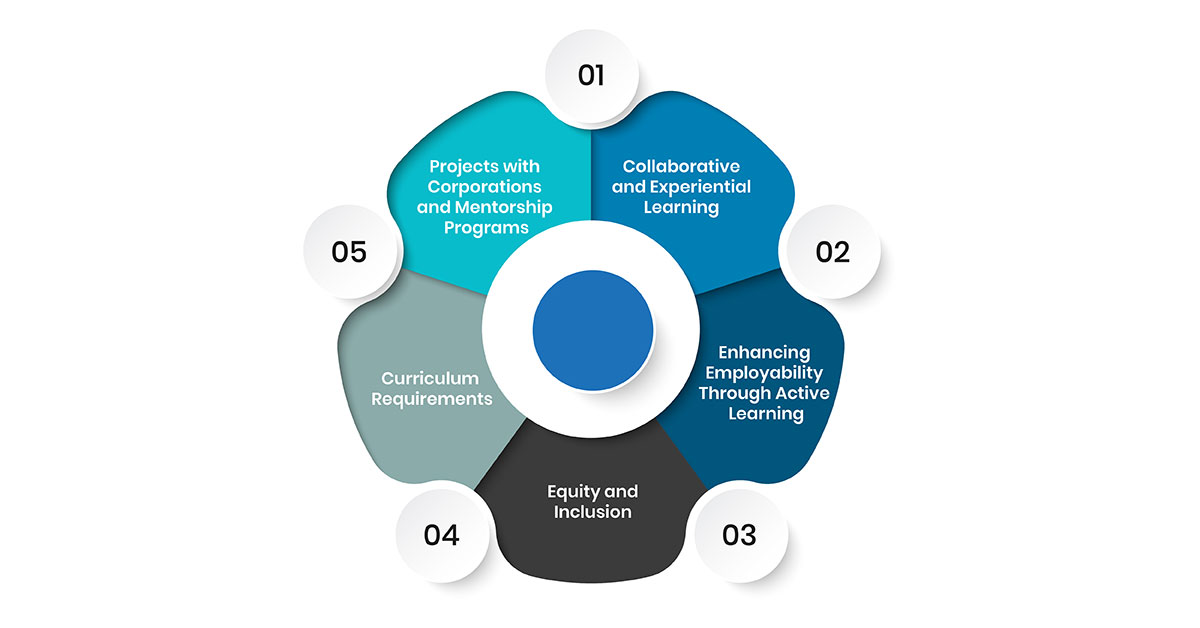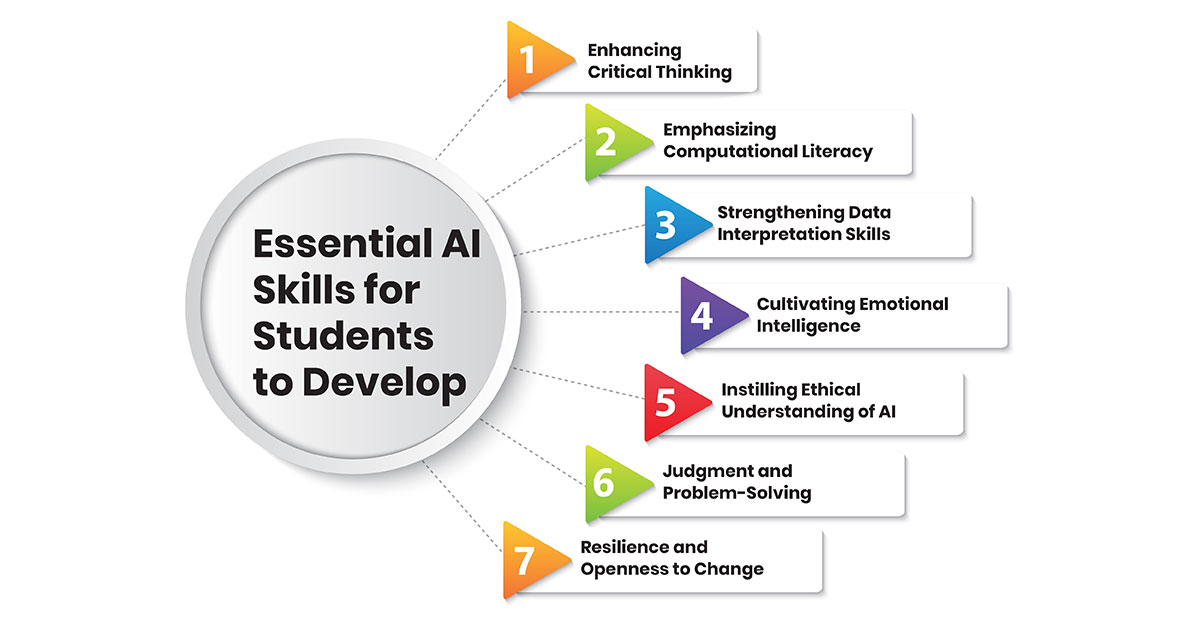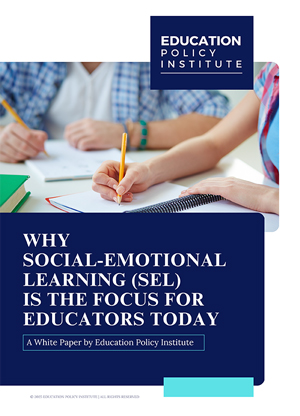In a rapidly approaching future dominated by artificial intelligence (AI), our educational approach must evolve. As AI becomes increasingly embedded in our consumer and business lives, universities must better prepare students for this changing world by integrating AI into higher education. This requires a deep dive into specific competencies essential in an AI-driven world, including careers in data science, machine learning, and advanced statistics. Universities are able to and ought to help students prepare for this shift through comprehensive curriculum changes and advanced tutoring programs.
In this AI-fueled future, preparing students to thrive has become a pressing concern for educators worldwide. Beyond specialized abilities, educational systems should focus on developing critical thinking and ethical understanding to enable students to navigate the complexities of an AI-powered future. By emphasizing life skills such as resilience, self-reliance, and sound judgment, universities can equip students with the tools needed to succeed and lead in an ever-evolving technological landscape.
Interventional Approaches Universities Can Take
Educational institutions, particularly universities, play a vital role in cultivating values like ethical awareness, empathy, and accountability among students to move through the complexities of an AI-driven world. Addressing the digital divide and promoting access to quality education are critical steps in ensuring that all students are equipped to thrive in an AI-powered future.
So, here are few approaches for universities to attend to:

-
1. Collaborative and Experiential Learning
Bringing up capable AI citizens requires a comprehensive approach blending interdisciplinary learning, hands-on projects, and active community engagement. Exploring AI's technical depths while examining its broader societal, ethical, and philosophical implications forms the bedrock for responsible AI engagement.Students should learn about AI collaboratively and actively shape it through their experiences. Planning AI tools for social good while critically analyzing potential biases and ethical considerations ignites critical thinking and cultivates moral awareness. Active community engagement connects students with experts, civil society organizations, and policymakers.
-
2. Enhancing Employability Through Active Learning
Traditional lectures are increasingly replaced by active learning models. Meta-analysis of 225 studies found that STEM students were 55% more likely to fail if taught through traditional lecturing rather than active learning. Active learning environments, which include group discussions, project assignments, and peer assessments, are particularly effective in developing problem-solving skills and adaptability.Beyond the classroom, formal internships, work placements, and participation in student clubs and societies significantly impact employability. Industry-facing approaches, such as internships and project work, provide valuable experience and help students build professional networks.
-
3. Equity and Inclusion
Ensuring all students have access to these opportunities is crucial. Students from higher socio-economic backgrounds are more likely to benefit from work experience, study abroad, and participation in student societies. Universities must address these disparities by providing financial support and flexible options for students with additional responsibilities. -
4. Curriculum Requirements
Universities must re-evaluate their core curricula to ensure students are prepared for the new age of employment. Incorporating computer science, entrepreneurship, and social impact classes into curricula is essential.A high-level understanding of machines is necessary to operate in an augmented workforce, while entrepreneurship principles help students innovate in any environment and understanding the societal impact of technology is crucial for accountable AI use.
-
5. Projects with Corporations and Mentorship Programs
Increasing university-corporate projects provides students with real-world experience and helps companies gain new perspectives. Classes driven by projects with corporations enable students to see how their academic curriculum prepares them for the machine-driven world.Additionally, mentorship programs offer guidance and support, helping students navigate career choices in the new AI world. Effective matching of mentors can provide insights into career setup, technology utilization, and employer selection.
Essential AI skills for Students to Develop
In today's rapidly evolving technological landscape, the integration of artificial intelligence (AI) into various sectors demands a comprehensive educational approach in which equipping students with essential AI skills is crucial for their success and responsible engagement with AI technologies.
Take a look at some indispensable skills to inculcate in students:

-
1. Enhancing Critical Thinking
Decisive reasoning is the backbone of effective critical thinking, navigation, and advancement. In an AI-dominated landscape, where algorithms increasingly influence various aspects of our lives, the ability to think critically is imperative. University systems must prioritize teaching students to critically analyze information, question assumptions, and evaluate the implications of AI technologies.Actionable Steps:
- Help recognize AI's presence in daily life, from social media algorithms to personalized recommendations.
- Impart the ability to grasp potential biases and limitations of AI systems, encouraging critical questioning and informed decision-making.
- Foster interdisciplinary learning to delve into the ethical and financial impacts of AI.
-
2. Emphasizing Computational Literacy
An AI-driven future demands more than basic computer knowledge; it requires computational literacy, understanding how AI algorithms work, and their applications in various fields. This involves grasping the 'language' of the future, such as starting with Python or Scratch for younger students and progressing to more complex AI concepts.Actionable Steps:
- Integrate coding and AI basics into the curriculum.
- Implement semester-long projects where students develop basic AI models.
- Provide resources and guidance for students to explore AI applications, from simple algorithms to data analysis.
-
3. Strengthening Data Interpretation Skills
Data literacy is as crucial as numeracy and literacy in an AI-driven world. It's about interpreting data to make informed decisions, understanding how AI systems make decisions and predictions.Actionable Steps:
- Incorporate data analysis projects using real-world datasets and tools like Excel or Google Sheets.
- Organize data analysis projects where students work in groups to interpret datasets, draw conclusions, and present findings creatively.
-
4. Cultivating Emotional Intelligence
Emotional intelligence is a uniquely human skill that AI cannot replicate. Skills like empathy, self-awareness, and interpersonal communication will be increasingly valuable in an AI-dominated future. Developing strong emotional intelligence is crucial for students to become effective leaders and professionals.Actionable Steps:
- Implement role-playing activities that simulate real-life scenarios, teaching empathy and effective communication.
- Create peer mentorship programs fostering empathy, leadership, and communication skills.
-
5. Instilling Ethical Understanding of AI
Understanding the ethical implications of AI technologies is critical. Students must be aware of the potential impacts of AI on society, including privacy concerns, bias in AI algorithms, and the societal impact of AI decisions.Actionable Steps:
- Organize workshops and discussions on AI ethics using case studies to illustrate the impact of AI on society.
- Develop guidelines for ethical AI use in specific industries, encouraging students to consider broader societal impacts.
-
6. Judgment and Problem-Solving
Experience is crucial in helping students hone their judgment and problem-solving abilities. Engaging in real-world problem-solving and implementing solutions to community issues can build these abilities. These skills enable students to make decisions that AI cannot.Actionable Steps:
- Provide access to laboratories and real-world studios for students to conduct research and master new technologies.
- Host problem-solving fairs where students showcase solutions to real-world problems.
- Encourage project-based learning that nurtures critical thinking and innovative problem-solving skills.
-
7. Resilience and Openness to Change
Students must be equipped with the confidence to embrace positive change and adapt to negative implications. Technology isn't static, and neither can students be.Actionable Steps:
- Foster an environment where students are encouraged to adopt new tools and technologies.
- Teach students to embrace new routines, economic realities, and opportunities, preparing them for the disruptions of the future.
By integrating these essential skills into the curriculum, education systems can prepare students to become capable and responsible AI citizens, ready to steer and thrive in an AI-powered future.
Conclusion
The role of universities extends beyond imparting technical knowledge; it involves developing a deep understanding of the communal, moral, and intellectual implications of AI as well.
By embracing these interventions and equipping students with a diverse set of skills, universities can play a pivotal role in shaping a future where humans and AI coexist harmoniously.
As we embark on this transformative journey, let us seize the opportunity to cultivate a new generation of leaders who are not just prepared for the AI revolution but are also committed to using technology ethically and responsibly for the betterment of society. Together, we can pave the way for a future where human ingenuity and technological advancement go hand in hand.
Latest
Trends blogs
- From Vision to Impact: Closing the Gender Gap in STEM Education
- Automation, Artificial Intelligence, and the Future of Human-Centered Education
- Mid-Career Education in a Changing Labor Market
- The Next Phase of STEM Education: The Role of Artificial Intelligence in Classroom Curricula
Focus blogs
- Research-Driven Education: Strengthening Strategies, Policies, and Classroom Practice
- Professional Certifications for Career Growth: What Students and Young Professionals Need to Know
- Building a High-Impact Center of Excellence: What You Need to Know
- Beyond Graduation: The Importance of Lifelong Learning in Higher Education





